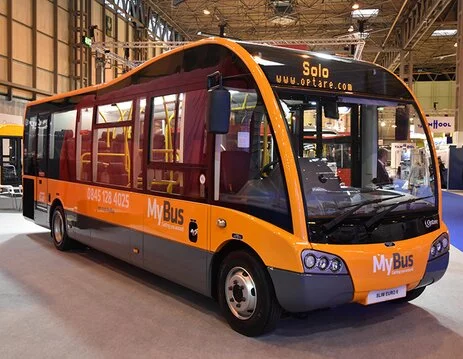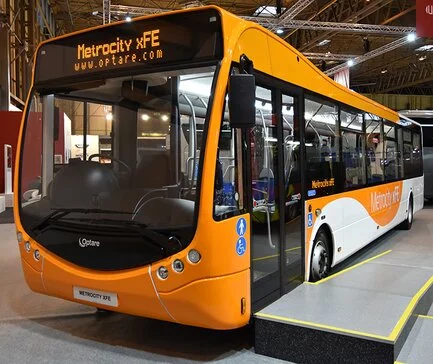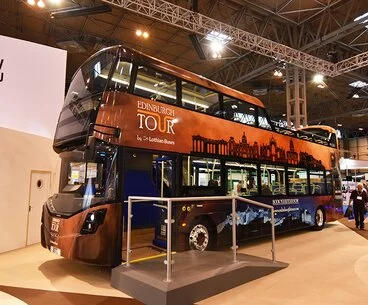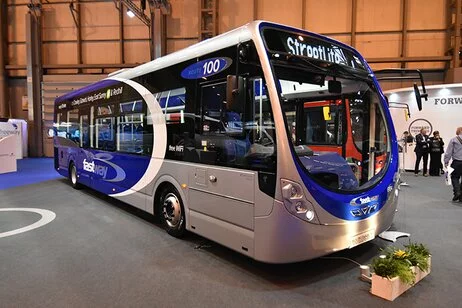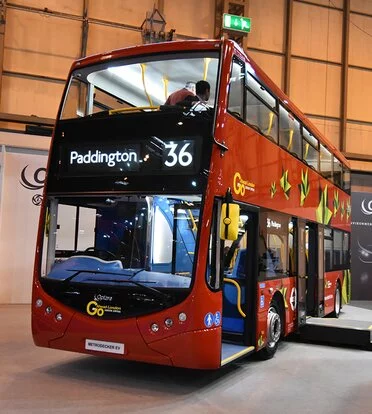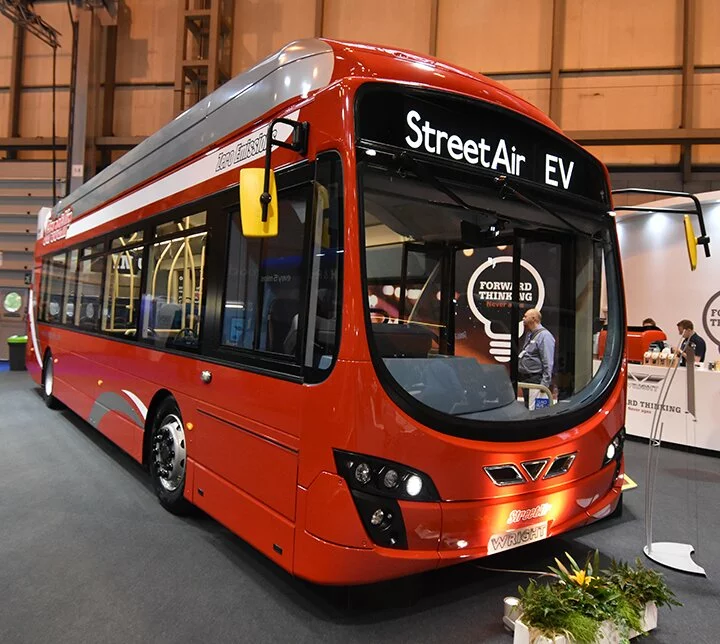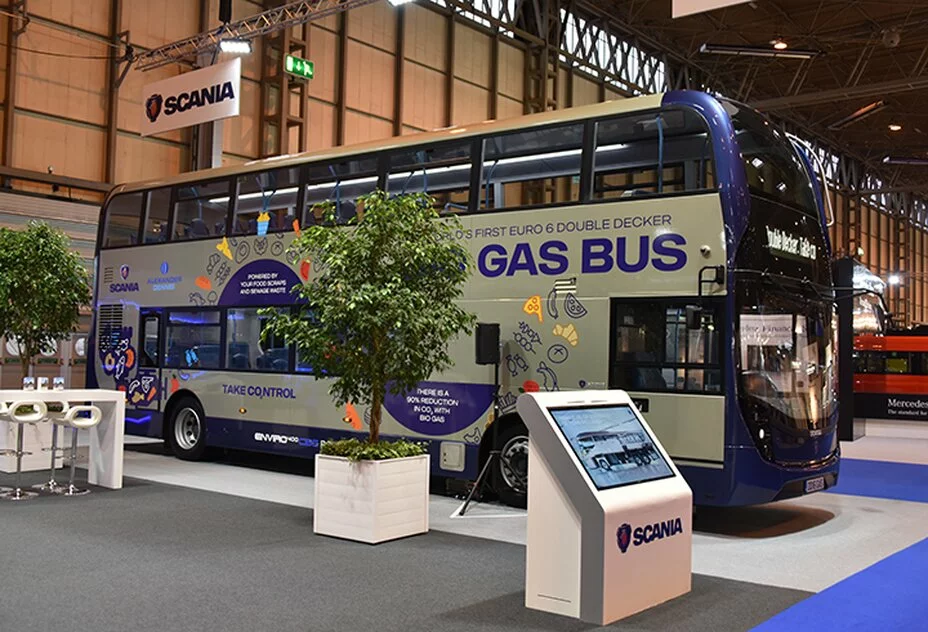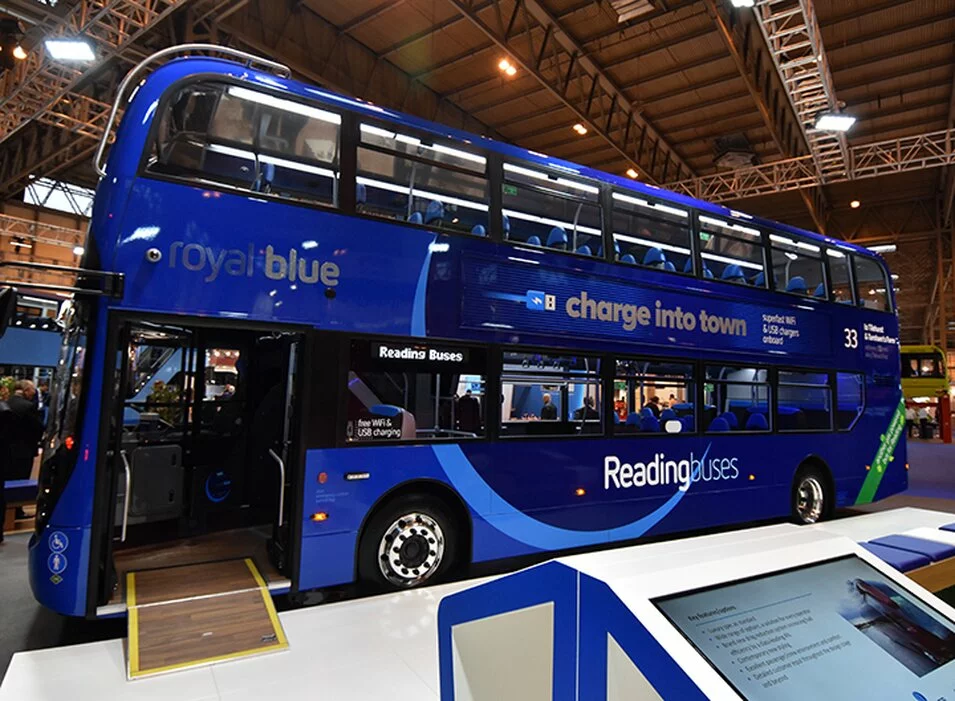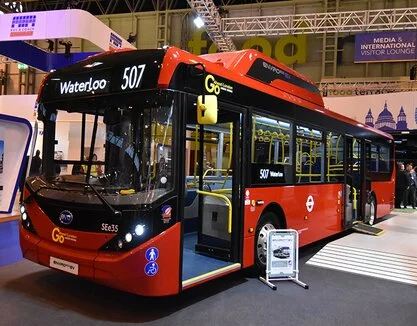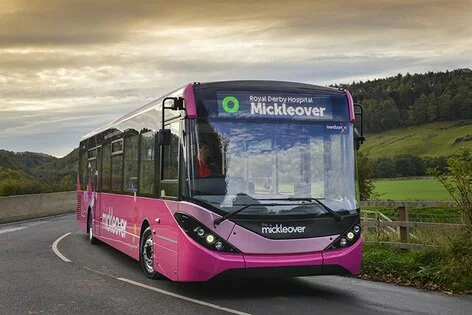- Home Page
- Fleet News Ramblings
- SKM News Views & Blog
- Behind The Picture
- Contact us
Commendation for Stagecoach East's Joe Somers at UK Bus Awards24/11/2016 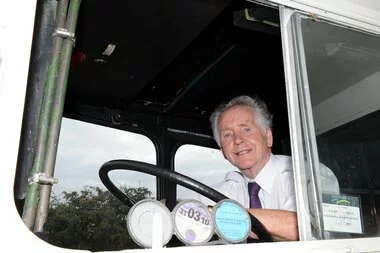
One of our friends at Stagecoach is Peterborough-based Joe Somers who has driven the Bristol FLFs and the Megadekka on many of the tours we have been involved with. So we are pleased to report that he has received a Special Commendation for Outstanding Service at this years' UK Bus Awards.
Joe had been shortlisted in the Unsung Hero category for which the UK Bus Awards nomination read: Joe Somers joined the bus industry in 1960 as a conductor because he was too young to be a driver, an ambition he fulfilled four years later. And in 1991 he became the first bus driver to pass the Institute of Advanced Motorists driving test in a double deck bus. He then went on to hold various roles at what eventually came Stagecoach East in Peterborough until starting his current role as Revenue Inspector and Customer Relations Officer ten years ago. Joe has also been involved with schools in the area promoting good bus etiquette, and investigating any issues or complaints on behalf of the schools. Although Joe works on a part time basis at the moment he still spends countless hours out of his personal time promoting the company and the benefits of public transport. Undeterred by his age Joe can still be found in full uniform carrying out his revenue inspecting on a Saturday afternoon. Well done Joe! Bridging the West Coast rail franchise gap9/11/2016 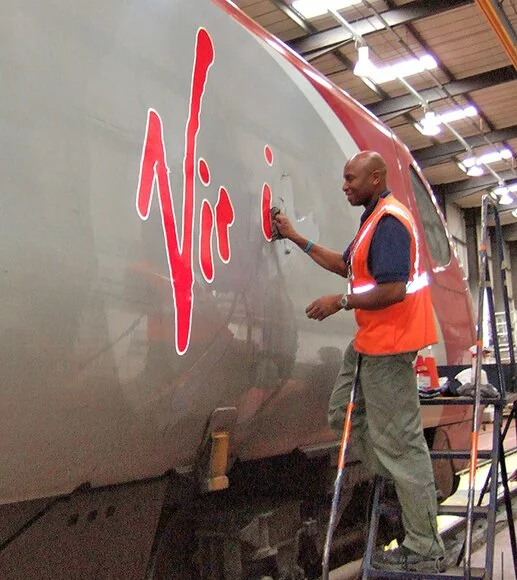 What is the long-term future for the Virgin logo remain intact on the West Coast? Will it remain post-2019 as the route enters a new era? What is the long-term future for the Virgin logo remain intact on the West Coast? Will it remain post-2019 as the route enters a new era?
It would appear that the recent announcement on the planned West Coast Main Line/HS2 joint franchise has left Virgin Trains - current operator on the West Coast route - wondering what happens next.
Last week (November 4th 2016) the Department for Transport (DfT) announced that the new West Coast Main Line franchise would also include preparation for, and initial operation of High Speed 2 (HS2) services. The DfT said the franchise would run for between three and five years after the start of initial HS2 services in 2026. But the existing West Coast franchise, which has already been extended, is due to finish im March 2018. That means that there will be a twelve month gap. But despite the announcement by the DfT, Steven Knight Media understands that no steer on what happens next has been communicated to current West Coast incumbent Virgin Trains. My thought is that a Management Contract/Direct Award will follow but some senior industry officials are even suggesting the DfT may put in its own team for 12 months operating the West Coast through its own Directly Operated Railways unit. I personally think that is unlikely. If Virgin does indeed remain in charge of the West Coast operation through until 2019 it will be able to celebrate 21 years of West Coast rail operation, having taken over the route in March 1997. Virgin also has experience of project management of big schemes, although most of the Major Projects team who developed and oversaw the transformation of the route are no longer with the business. That must put it in a good place when bidding for the West Coast Partnership franchise gets underway. But beyond bidding it is into the unknown. Virgin could indeed welcome in the dawn of a new era of West Coast/HS2 rail operation or it could see itself thrown off the route. Interesting times ahead. The government says the new West Coast franchise will combine the current InterCity West Coast services with the development and introduction of High Speed 2 services. The new franchise - the West Coast Partnership - will be responsible for services on both the West Coast Main Line from 2019 and designing and running the initial high speed services from 2026. The franchise, which will run for the first three to five years of operation of HS2, is the first step in attracting a world-class bidding group to develop and enhance the service for West Coast passengers and pave the way for the introduction of HS2 services in the future. Transport Minister Andrew Jones said: “We are embarking on a new chapter in our modernisation of the railways and we need world-class expertise to deliver it. “HS2 will be the backbone of Britain’s railways, creating more seats for passengers on the West Coast and increasing capacity on the rest of the network. By combining the franchise we are ensuring we get the right people on board at an early stage to design and manage the running of both services in the transition stage. The new franchise will attract highly experienced companies, who have the right experience, which ultimately means a better deal for passengers - both now and in the future. “HS2, Britain’s new railway, will reduce crowding on the existing network and generate economic growth up and down the country. Phase One due to open in 2026, will see trains travel at high speed between London and Birmingham before running on from Birmingham on the existing West Coast Main Line, setting a new benchmark in passenger experience along this route”. Chairman of HS2 Ltd Sir David Higgins said: “This is a real opportunity to ensure HS2 services complement and enhance existing ones. I have always been clear HS2 will not be a standalone railway but fully integrated with the wider network. It will provide a new backbone for our railways, modernising services to better serve towns and cities up and down the country. “Bringing on board a new partner to work with HS2 Ltd now will help ensure we are working towards the same goal. “The new West Coast Partnership franchise will provide a strong private sector partner to work with the government, a partner who must combine experience of delivering both conventional and high speed railway operations, transforming customer service through the use of cutting-edge technology. “The franchise will deliver excellent services for West Coast passengers while working collaboratively with the HS2 construction project to develop the best solution for passengers now and in the future”. The DfT says that the new operator will need to build on the existing West Coast franchise to deliver a service which puts the needs of passengers first - driving up reliability and punctuality and improving connections to better serve towns and cities along the route. West Coast passengers will also see benefits before the introduction of HS2 passenger services through the early introduction of new technology being developed for this new railway. The partnership approach means the winning bidder will collaborate with HS2 Ltd to design, launch and operate the initial HS2 services and deliver the transition of the timetable on the West Coast Main Line as it is revised to take advantage of the extra capacity provided by HS2. “The completion of the first phase of HS2 will nearly triple the number of seats at rush hour from 11,000 to around 30,000. The majority of intercity trains will run on the high speed network, allowing more commuter services to run on the West Coast line. The new operator will work closely with local transport authorities, Transport Scotland and the Welsh government to give passengers the better experience they demand from the West Coast Main Line. The formal expression of interest (EoI) for the West Coast Partnership is due to be published in December 2016, followed by the invitation to tender (ITT) in October or November 2017, with the new franchise scheduled to start 1 April 2019. EuroBus expo 2016 photo round-up2/11/2016 Reading Buses showcase at EuroBus expo 20162/11/2016 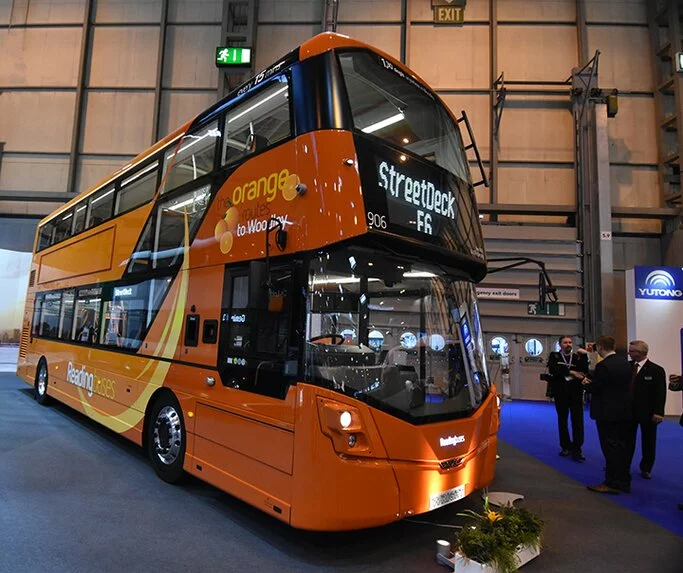
Reading Buses had a big presence at EuroBus expo 2016 with two of its new vehicles on display on the stands of two manufacturers.
On the ADL stand was one of the operators new Enviro 400CBG gas-powered double deks in the Royal Blue livery for route 33, whilst on the WrightBus stand was StreetDeck (fleet number 906) which is finished on Orange livery for services to Woodley. This show vehicle also ‘launched’ the illuminated fleet name on the panel below the windscreen ADL showcases its products at EuroBus expo 20162/11/2016 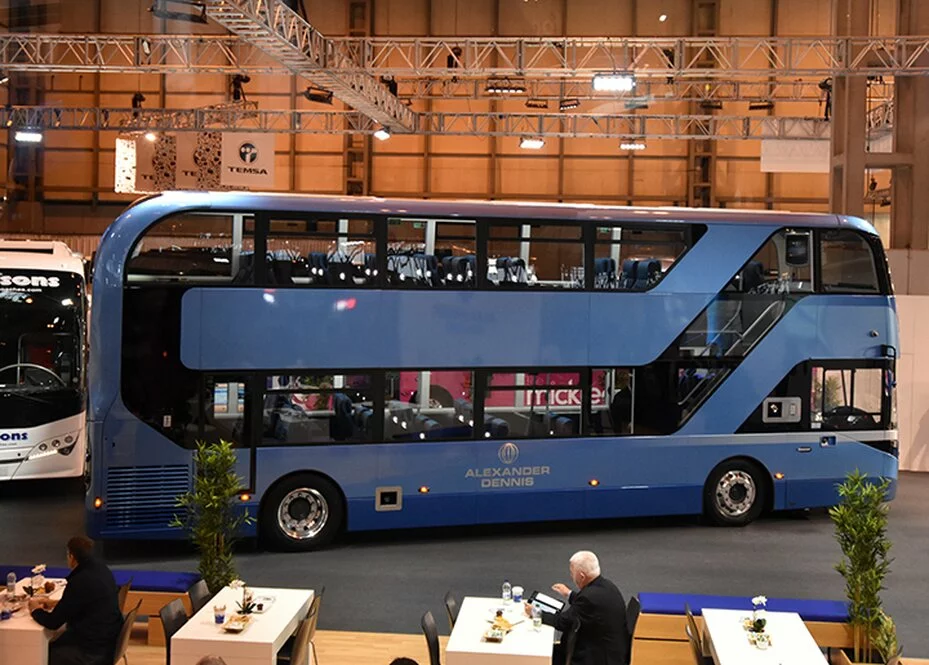
The bus and coach industry - vehicle builders, component manufacturers and suppliers – is showcasing its products at Euro Bus Expo 2016 at the NEC. The show opened on November 1st and runs for three days. It provides the opportunity for deals to be done between manufacturers and bus and coach operators. It also gives the media the opportunity to get updates direct from companies exhibiting and SKM was there.
The first day of the show kicked off with a press briefing from ADL, who announced that 2015 had been a record year with 2,750 units (vehicles) sold with revenues for 2016 expected to exceed £600 million for the second year in a row. But there was a sound of caution in that 2017 will herald the post DDA deadline and also the impact of the Brexit announcement. That said in the UK ADL maintains a 60% market share of the single deck market and a 50% market share of the double deck market. A success this year has been the order for 20 Enviro 200s from Trent Barton, which represents the first new buses from ADL (and its previous incarnations) for almost 20 years and follows the order last year for new coaches for the Red Arrow operation. ADL is also supplying the first ever double deck buses in the UK, which are going to innovative Reading Buses. They have a 10%-20% lower CO2 emission than a standard Euro 6 diesel powered vehicle. Also on the ADL stand was one of the electric Enviro 200EV vehicles that are being supplied to Go Ahead London for the former Red Arrow 507 and 521 routes. But it was evident that the showpiece was the Enviro 400City, which was on display. The demonstration vehicle has what ADL calls it’s ‘Passenger Plus Pack’. This has leather seats with a smart console in the seat back. The console incorporates a wireless bell push, USB socket and a power socket and LED reading lights. Also fitted are a coat hook and a fold down table. Wates bins have also been incorporated on both saloons, something ADL says operators are calling for. On the upper deck, executive style single seats next to the staircase maintain passengers’ privacy while making it easy to move around at this potential pinch point. Social seating is grouped around tables which have USB power sockets integrated in their surface. The social seating areas at the back of the top deck offer an unrivalled feeling of spaciousness thanks to the wrap-over SkyView rear window that complements three wide, glazed SkyLights along the length of the bus. The absence of vertical hand rails in the upper saloon gives a spacious, airy appearance that is enhanced by its deep side windows. Ambient and dimmable saloon lighting is complemented by LED downlighters to create a mood lighting experience. Also under development is an Autonomous Emergency Braking System (AEBS) for buses. Unlike similar systems in coaches, which are primarily designed for motorway running, this AEBS focuses on situations typical to urban bus operation and prevents collisions not only with other motor vehicles, but also with pedestrians and cyclists. It utilises cameras fitted to the windscreen and radar sensors located behind the front dash. The first ADL buses with AEBS are currently undergoing rigorous testing to validate and calibrate the system ready for a market launch towards the end of next year in the Enviro 200 and Enviro 400 ranges. |
Steven KnightSteven Knight is a Transport Specialist who has over 40 years experience in the bus and rail industries as well as in specialist transport journalism. He is a member of the Chartered Institute of Journalists. ArchivesJanuary 2021 |
 Create your own unique website with customizable templates.
Create your own unique website with customizable templates.
- Home Page
- Fleet News Ramblings
- SKM News Views & Blog
- Behind The Picture
- Contact us

